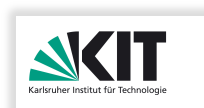TM - Institute of Telematics
At Instudute of Telematics our research and our teaching basically address the engineering of networked systems, especially in the context of the Internet and Internet technologies. We work on a diverse range of topics spanning from innovative network technologies and protocols to service-oriented architectures, network security and privacy protection, data-intensive computing, energy informatics and the human-machine interface of networked systems.
By participating in numerous research and industry projects, the Institute of Telematics builds a bridge between fundamental and applied research. Currently, we pay particular attention to a wide variety of application domains in the context of the Internet of Things, e.g. Industry 4.0, future energy systems and scientific data. In our research we apply a wide range of methods, e.g. analytical and simulative evaluation, machine learning, prototype implementations and extensive testbeds.
As part of the BMBF-funded competence center for applied security technology KASTEL, the Institute of Telematics is conducting research in areas such as flexible network security concepts based on Software Defined Networking and virtualization and using blockchain technology for privacy protection.
The objective of the BMBF-funded "Kopernikus" Project ENSURE is to design a new network structure for the energy grid of the future. Here our Institute is involved i.a. in the design of robust and secure communication networks.
With the Smart Data Innovation Lab (SDIL), the Institute of Telematics houses one of the three largest big data centers funded by the BMBF.
As part of the bwNET100G+ project, researchers from the Institute of Telematics are working closely with SCC staff to develop innovative and practical solutions for the operation of high-performance networks.
Through professors associated with the SCC management, our institute has connections to major national and international infrastructures such as the GridKa data center for the LHC of CERN, the supercomputer ForHLR at KIT, the Helmholtz Data Federation and the European Open Science Cloud.

